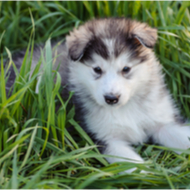All-in-one genetic test available for five new breeds

Pictured: an Alaskan Malamute puppy.
The Kennel Club, in collaboration with Weatherbys, has announced the availability of its CombiBreed all-in-one health test packages for five new breeds.
The new tests are now available for the Alaskan Malamute, Leonberger, Norwegian buhund, papillon, and poodle (miniature).
Simplifying the process of genetic testing by using a single cheek swab to check a dog's DNA, the CombiBreed tests check for markers associated with a number of various inherited disorders.
It is hoped that by making genetic resting more accessible, new breeders will be encouraged to make the health of the puppies they breed a priority, and help to eradicate the genetic conditions tested for.
All results from the CombiBreed tests will be automatically registered on the dog's record, and will be freely available to access on the Kennel Club website – allowing prospective puppy buyers to check if a puppy has come from health-tested parents.
Bill Lambert, health, welfare and breeder services executive at The Kennel Club commented: “One of our primary aims for these tests is to simplify the process by offering an all-in-one product which checks for all the diseases that are of most concern for a breed, and provide understandable advice to help breeders make informed and responsible breeding decisions.
“It is important that health testing is as easy as possible, whether that’s for a first-time breeder of a one-off litter, or someone who regularly breeds.
“These five new breed packages join 61 other breeds that already have a CombiBreed health test package available. We will be continuing to work with researchers, vets and our breed communities to determine the priority health tests for each breed and collaborate with our trusted scientific partner, Weatherbys, to expand our offering and provide a quality and trusted service.”
The tests are available to order directly from the Kennel Club shop at thekennelclub.org.uk/shop/health/ and further information can be found on the tests here.



 The veterinary mental health charity Vetlife is inviting the veterinary community to join it for a sponsored cold-water dip.
The veterinary mental health charity Vetlife is inviting the veterinary community to join it for a sponsored cold-water dip.